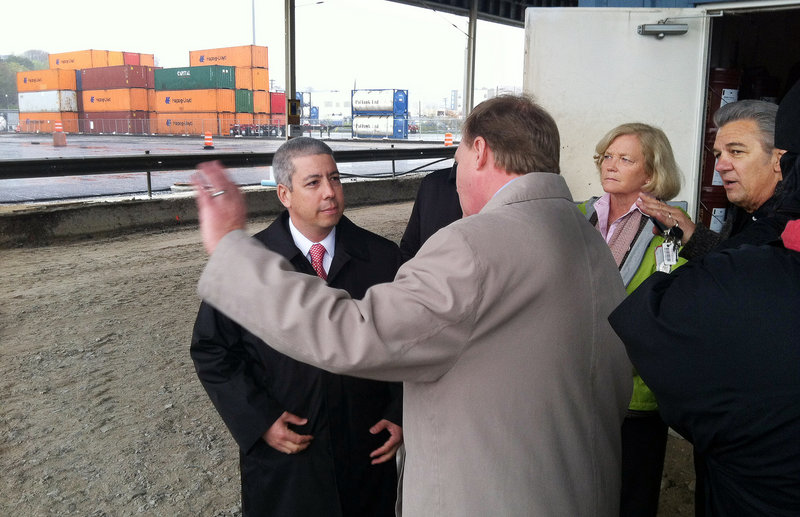PORTLAND – Harry Turgeon is still waiting for the delivery of two snow tractors from Germany. The tractors are parked on a container ship that has been stranded in Halifax Harbor in Nova Scotia since the shipping company that operated the vessel shut down last week.
The tractors were being shipped to Portland as part of a test run to convince the German manufacturer of the tractors that the container service was reliable, said Turgeon, who handles shipping logistics for Kassbohrer All Terrain Vehicle in Lewiston.
He said the tractors will eventually be transported to Auburn on a rail car through Montreal.
The bigger problem, he said, is the demise last week of New York-based American Feeder Lines, which had linked Portland and Halifax. He had high hopes for the service because picking up deliveries in Portland rather than New York would save both time and money.
Even if another service gets started, he won’t be able to use it because it would be too risky.
“There is a credibility issue,” he said, adding that it appears Maine does not have enough exports and imports to sustain a dependable container service.
Halifax is an important link for Maine because it is served by huge cargo ships that can deliver Maine goods around the world.
The arrival of American Feeder Lines last summer was supposed to prove that Maine’s largest port could support stable and reliable freight service to Halifax. But the service’s sudden end will make it ever harder for the state to recruit another shipping company to serve Portland, acknowledged John Henshaw, executive director of the Maine Port Authority.
“We have created an even bigger challenge for ourselves in the next go-around,” he said. “We have definitely developed a credibility problem.”
Indeed, financial woes are nothing new for shipping companies that try to serve Portland:
• A barge that took wood pulp to New York stopped calling in 2009.
• Previous container service to Halifax ended in 2008 when another company pulled out.
• Container service was disrupted in 2006 when the container ship K-Wind was seized in Halifax because of a financial dispute between the ship’s owner and a subcontractor.
• In 2004, federal marshals seized a different container ship, the Shamrock, in Portland Harbor in a dispute over payment of the ship’s mortgage.
Henshaw said the solution may come in the form of a new type of vessel that would be better suited for the Portland market.
To be successful here, he said, a container service needs to connect Portland with the Port of New York & New Jersey, which is served by more international steamship lines than Halifax, and thus has more options and lower rates.
The problem, though, is that a long-standing federal law called the Jones Act requires vessels that travel between domestic ports be manufactured in the United States and manned by American crews.
Those requirements increase the cost so much that it’s difficult to compete with trucks and rail. There’s not a U.S. container ship available anywhere on the East Coast, he said.
U.S.-built barges are an option in other parts of the country, but they can’t operate in the open North Atlantic during bad weather, and shippers need regular service.
Henshaw said the U.S. Maritime Administration has developed the concept of an “articulated tug barge,” a hybrid vessel that is essentially a barge with a profile of ship. It is propelled by a push tug attached to the stern in a notch, so it functions like a ship in the ocean.
Henshaw said it can be built at a third of a cost of a standard container ship and operated with only six people in a tug rather 15 to 20 people on a container ship.
On Friday, Henshaw discussed the hybrid concept with David Matsuda, who heads the U.S. Maritime Administration, during Matsuda’s tour of the International Marine Terminal, along with U.S. Rep. Chellie Pingree, D-1st District.
Matsuda said the vessel would also be useful to the U.S. Department of Defense and that the federal government is looking for a private-sector partner to build the vessel in the United States, possibly in Maine.
A U.S. ship that could connect Portland to New York would also be able to deliver cargo for U.S. markets, said Jack Humeniuk, business agent for the International Longshoremen’s Association Local 861. The Eastern Steamship Company, which suspended operations in 1954, was the last company to offer domestic cargo service out of Portland, he said.
Construction of the federal interstate highway system gave a competitive advantage to the trucking industry, Humeniuk said. But the highways and rail lines around New York in southern New England are now congested, he said, and a hybrid vessel could be competitive now with trucks, especially for heavy cargo.
Humeniuk said he is not deterred by the failures of the past container services.
“It’s just getting the right technology,” he said. “It’s a low-cost alternative and a green alternative. It’s definitely going to happen.”
Staff Writer Tom Bell can be contacted at 791-6369 or at
tbell@pressherald.com
Send questions/comments to the editors.



Success. Please wait for the page to reload. If the page does not reload within 5 seconds, please refresh the page.
Enter your email and password to access comments.
Hi, to comment on stories you must . This profile is in addition to your subscription and website login.
Already have a commenting profile? .
Invalid username/password.
Please check your email to confirm and complete your registration.
Only subscribers are eligible to post comments. Please subscribe or login first for digital access. Here’s why.
Use the form below to reset your password. When you've submitted your account email, we will send an email with a reset code.